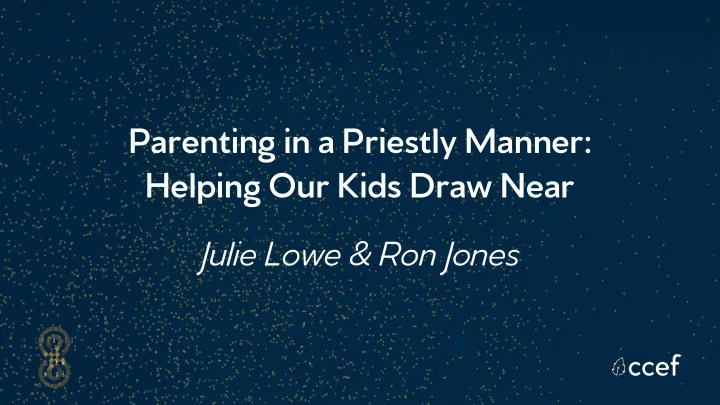

Parenting in a Priestly Manner: Helping Our Kids Draw Near Julie Lowe & Ron Jones
“Have we talked with our children this week about the delights of living more than the disciplines of living? Have we inspired and guided them more than we have corrected them?” – V. Gilbert Beers
“And these words, which I am commanding you today, shall be on your heart; and you shall teach them diligently to your sons and shall talk of them when you sit in your house and when you walk by the way and when you lie down and when you rise up. And you shall bind them as a sign on you hand and they shall be as frontals on your forehead. And you shall write them on the doorposts of your house and on your gates…” Deuteronomy 6:6–9 (and following verses)
Priestly parenting means: • We diligently teach them the ways of Lord • We pronounce blessings upon them • We strive to help them battle sin and temptation • We help facilitate fellowship with the Lord • Encourage service and fellowship in community (individualistic vs. life in household)
Why do we struggle with this? • Pace of life • Cultural priorities • Feeling inadequate • We value compliance, over dialogue (or relationship) • We look for quick fixes rather than long-term relationship building • Working to connect to at each stage of development
There are many voices calling out to young people. Our children will be wooed by someone’s voice. Whose will it be ?
The voice of peer influence • A false sense of maturity or confidence in their self-knowledge • Intolerance of wisdom – mocking what is good & wholesome • A lack of humility and teachability • Limited relationships with wise, godly adults • Idolizing/imitating peers
Peer voices vs. adult voices Peer/cultural influence Parental/adult Influence • Lacks life experience • Looks out for the child • Limited in resources and help • Assumes greater life • Lacks insight & wisdom experience and wisdom • • Assumes autonomy & Sacrificial love for the child • Understands we all need help maturity • Sees adults as inadequate or • Values building relationship insignificant • Knows the Lord for the • Is often self-serving source of truth • “My Truth”
Wise voices • It builds respect and cooperation. • It creates an atmosphere of deference and admiration. • It provides security and connection with children. • It encourages a child’s healthy dependence on parents for spiritual and emotional nurture. • It models a reliance on wise counsel, especially from the Lord. • It models a proper respect for leadership and governance.
Fostering conversation “The skill is to listen, the gift is to hear.”
“We are told the average child asks 500,000 questions by the age of fifteen. That’s half a million opportunities to teach. Many of these are “why” and “how” questions which take us right to the feet of God.” John M. Drescher
Commit to understanding your kids “The purposes of a man’s heart are deep waters, but man of understanding draws them out.” Proverbs 20:5
Building bridges • Nothing can substitute a genuine care and concern • Share (appropriately) your failures and struggles • Pursue your kids, be proactive • When a child says “I don’t know” • Look for opportunities to talk and ask questions (and really hear their heartbeat) • Be willing to bring up the hard topics before they do. Demonstrate you are not inadequate or indifferent • Be willing to come back to hard conversations • Affirm your love for them • Forced family fun
It’s never too late “Developing Christian standards is like building a fire in the rain. It requires willful determination, against all odds, to do what seems impossible. It calls for expertise– know-how which understands the stubborn nature of the child and the nature of a hostile world. It demands a stubborn perseverance to keep fanning the flickering flame, to keep protecting the hot coals.” Howard G. Hendricks
Recommend
More recommend